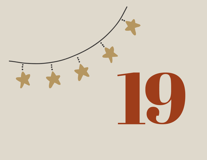Advent Prayer Challenge Day 24 - December 20
Regifted Miracles
Read Luke 1:26-38
Light four candles and say together
O Clavis David: O Key of David,
O royal Power of Israel controlling at your will the gate of Heaven:
Come, break down the prison walls of death for those who dwell in darkness and the shadow of death;
and lead your captive people into freedom.
Reflection
Our miracles are never just meant for us.
Throughout the Old Testament, God is often referred to as “The God of our forefathers.” This title usually also refers to God as “the God Abraham, Isaac, and Jacob”. There is a lot of power to this title because it carries the strength of someone else’s conviction—someone that listeners know to trust and respect. This is the ultimate introduction: You can know God is God because Abraham, Isaac, and Jacob encountered God as God.
But it is more than an honorific. This concept plays out in reality throughout the Old Testament. God became the God of Abraham through a deep, lasting relationship, which proved that God was ultimately faithful and trustworthy. When Abraham was called to walk up a mountain to sacrifice his only son, (Genesis 22) Abraham had already walked with God for around a century, and He trusted God to provide. I have come to see this journey toward the altar on Mount Moriah as a spiritually formative event for Abraham’s son, Isaac. As he journeys up the mountain, realizing there is no sacrifice for the altar, he can rely on his father’s deep faith until he himself will have the opportunity to see God’s faithfulness and provision for himself.
I see this theme mirrored here at the beginning of the nativity story in Luke. It is impossible to read Luke 1 and not compare the two miraculous birth announcements. There are so many similarities between Zechariah’s angel visit and Mary’s. Both Zechariah and Mary both even ask a question, but their questions include subtle but meaningful differences. In his confusion, Zechariah effectively asks how he can know that what the angel said is true (as if the mere presence of an angel wasn't proof enough,) but in her confusion, Mary asks how it will all work, trusting that it will.
There is another difference in the announcements. Mary is also alerted to the fact that her relative Elizabeth is experiencing a miraculous birth as well. It feels like such kindness to assure Mary that she is not experiencing this alone. These miraculous births had history-shattering consequences for all people, but personally, Elizabeth’s miracle blessed Mary and Mary’s miracle blessed Elizabeth.
Our faith is not simply between us and God: We are invited to access the blessings found in being part of a faithful community and we have the opportunity to bless others through our experiences with God.
God has and will continue to provide people to journey with you because He is Love and love happens in community. We see a microcosm of this in Mary and Elizabeth's experience. And Jesus’s birth is the ultimate image of this expression of Love. He joined our world, walked side by side with us, broke bread with us, faced death with us. Jesus is God becoming ultimately personal so that the God of the universe does not have to merely be “the God of [this faithful person I know]” but “my God.”
Reflect and Discuss
- How have you been encouraged by someone else’s faith story?
- How can your faith encourage others?
- When have you found encouragement in sharing an experience with someone else?
- How can you foster a faithful community this week and into the new year?
Pray
Thank you Jesus for the way you lead people gently to you through the faith stories of others. May we be encouraged today by Mary and Elizabeth’s miracles. Lead us towards those who we can encourage and those who can encourage us.
Amen
Advent in Action
Go for a drive or a walk through your neighbourhood to look at Christmas lights. Consider how these light displays are beacons of light that encourage anyone who views it.
More information about our Advent Prayer Challenge can be found here.
Click here to subscribe to daily reminders.

Advent Prayer Challenge Day 23 - December 19
Notice Read Luke 1:5-25 Light four candles and say together O Radix Jesse: O Flower of Jesse's stem, you have been raised up as a sign for all peoples; kings stand silent in your...
